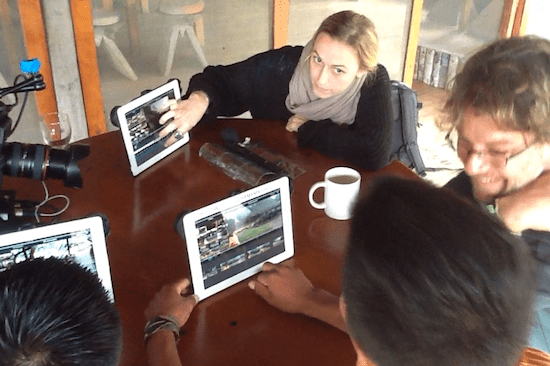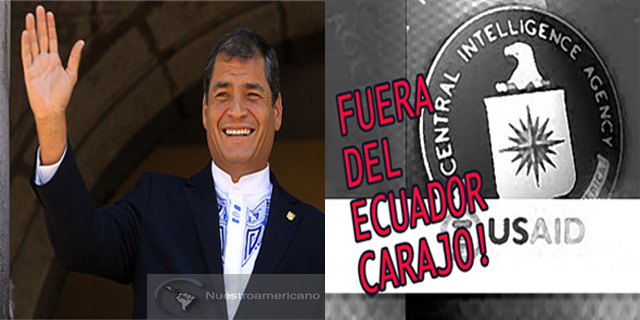Oct 04
20150
Foundations, National Endowment for Democracy [NED], Non-Profit Industrial Complex, USAID
Ecuador Freedom House Fundamedios Human Rights Watch Media National Endowment for Democracy (NED) USAID
US-Funded NGO in Ecuador Accused of ‘Political Meddling’
September 10, 2015
A composite image shows a number of tweets issued by Fundamedios that Ecuadorean official allege show the political nature of the work by the NGO. | Photo: El Telegrafo
Ecuadorean officials allege that Fundamedios has engaged in “partisan political activities.”
The U.S.-funded non-governmental organization Fundamedios received notice that a state regulator in Ecuador has begun the process for the dissolution of the organization, saying the organization was not sticking to its mandate.
The National Secretariat of Communication, known as the Secom, claims that Fundamedios has deviated from its stated mission, intervening in political matters; something that is prohibited by Ecuadorean law and the organization’s own internal statutes.
Fundamedios says on its website that its “main task is to support media and journalists through its network of monitoring threats to freedom of expression and association.” The organization began its activity shortly after Rafael Correa took the presidency in 2007.
According to the Secom, Fundamedios engaged “partisan political activities” by sharing material on its social media accounts, publishing articles unrelated to its stated mission and inserting itself into political debates in the country.
On repeated occasions Fundamedios has declared its support for political organizations and personalities opposed to the government of Rafael Correa on matters completely unrelated to freedom of expression.
Decree 16, issued by the Ecuadorean government, states that organizations that deviate from their mission are subject to dissolution. The organization has 10 days to argue its case.
“Fundamedios is a political actor in this era that the country is living in,” Orlando Pérez, director of public newspaper El Telegrafo, told the Andes news agency.
However, in an interview with El Comercio, the organization’s director denied the charges, saying, “We did not deviate a millimeter from our statutes, we are fulfilling our objectives.”
Fundamedios’ Impartiality Questioned
The work of the organization mostly consists of issuing “alerts” regarding alleged attacks against journalists in Ecuador.
The organization is funded in part through a US$84,000 grant from the U.S.-funded National Endowment for Democracy. U.S. Ambassor to Ecuador Adam Namm told El Telegrafo that Fundamedios received US$300,000 in 2012 from USAID, which receives its funds from the U.S. government.
In a press conference called to denounce the decision by the Secom, the director of Fundamedios, Cesar Ricaurte said that the decision to dissolve his organization constituted an “attack against the press.”
However, Ricaurte is openly hostile toward journalists who work for public media outlets, on one occasion calling a journalist an “agent of the state” who was guilty of “persecution” by virtue of her work for a public outlet.
Many of the alerts regarding alleged “attacks” on the press involve directives issued by a state regulatory agency known as the Supercom, which is tasked with ensuring that outlets respect Ecuadorean media laws. The law ensures that sensitive material is broadcast at appropriate times and that outlets report news accurately.
When media outlets contravene the law, Supercom has the authority to mandate the outlet comply by publishing corrections.
Fundamedios is also selective about the cases it chooses to champions, only coming to the aid of journalists who work for private media outlets and declining to support journalists who work for state-run media.
Several journalists were the victims of physical attacks by demonstrators during often-violent opposition protests that took place in Ecuador in August. The situation was so dire that several journalists called a press conference to denounce the attacks, Fundamedios declined to support these journalists and failed to issue any “alerts” regarding these aggressions.
The organization issued an “alert” over alleged attacks against Fernando Villavicencio, a former opposition politician now working as a journalist. Villavicencio was a fugitive from justice for over a year after being found guilty of slandering president Rafael Correa, accusing him of orchestrating the 2010 coup. Villavicencio was caught on camera physically assaulting Jose Luis Quinteros, a journalist with a public TV outlet. Fundamedios remained silent on this issue.
A number of other NGOs hostile to the government of Rafael Correa, such as Human Rights Watch and Freedom House, have come to the defense of Fundamedios.
Updates:
September 13, 2015:
Journalists in Ecuador Back Decision Against US-Funded NGO
September 16, 2015:
Media Experts Criticize Ecuadorean NGO for Political Posturing
September 26, 2015:
US-Funded Media NGO Given Reprieve by Ecuadorean Authorities
Further reading:
March 12, 2015:
How the US Funds Dissent against Latin American Governments






















